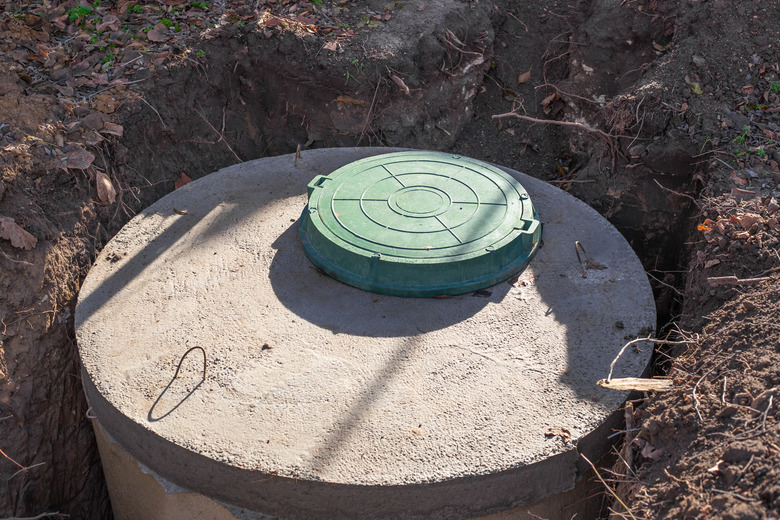Septic Tank Problems When It Rains
We may receive a commission on purchases made from links.
Most of your septic system is sealed and unaffected by heavy rain, but one part — the drain field — is not, and a heavy rain can definitely affect it. If it has been raining particularly hard and there's a pond forming in your drain field, you may experience the symptoms of a blocked septic system. The best course of action is to reduce water consumption in the house until things dry out.
Anatomy of a Septic System
Anatomy of a Septic System
If your house is serviced by a septic system, there is a tank buried in your yard — usually within 100 feet of the house. It has an inlet for waste coming from your house and an outlet leading to the drain field. In a properly functioning system, solid matter stays in the tank, while black water exits the tank and ends up soaking into the ground in the drain field. If you live on a sloping property, your drain field may be on higher ground than the tank, so your system may also include a transfer pump that cycles on when the tank is full.
Symptoms of a Flooded Septic System
Symptoms of a Flooded Septic System
You don't need anyone to tell you when it has been raining hard, but you may not recognize the symptoms of a flooded system at first. As the soil in the drain field becomes saturated, septic water can't soak in, and it may rise to the surface and create an odor. As the condition worsens, water backs up into the tank, and if you have a transfer pump, the pump may start running continuously. Eventually, because the water has nowhere else to go, it ends up in your plumbing. You'll notice slow draining, poor toilet flushing, and, in extreme circumstances, overflow from floor and shower drains and even from toilets on the ground floor.
Occasional vs. Frequent Flooding
Occasional vs. Frequent Flooding
Flooding in the drain field is never a good sign, because efficient percolation is essential for your septic system. If you're having a deluge, and this is the first time you've seen flooding, then you probably don't have a long-term problem. If you frequently see puddles during moderate rainstorms, though, you should have your septic drain field inspected when the ground dries out. The soil may be saturated with runoff from the tank, and if so, it's just a matter of time before your system fails. If you find you need a new drain field, you'll be able to have it installed while the old one is still functioning, and you can still use your plumbing.
How to Handle Septic Flooding
How to Handle Septic Flooding
If you notice puddles and septic tank odor during a heavy rain, reduce water in the drain field by rerouting any roof drainage that goes there. Temporarily shut off the power to the transfer pump in the tank, if you have one. This not only saves electricity, it prevents the pump from burning out. You should reduce water usage in the house to what's absolutely essential, because every time water goes down the drain, it adds to the excess in the tank. Take short showers or use a no-rinse body wash, flush toilets as seldom as possible, and avoid using the dishwasher and washing machine.
